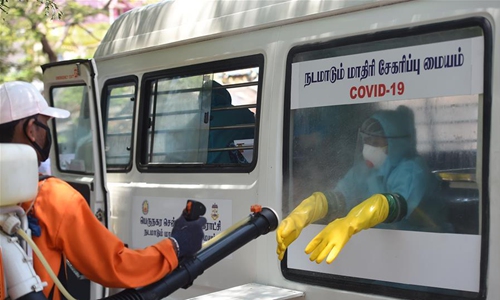-

- Liu Zongyi
- Associate Research Fellow
- Center for Asia-Pacific Studies
- Institute for International Strategic Studies
- A ‘China hand’ from India bears high hopes amid the current stalemate
- India rebalances between US, Russia, but China strategy remains unchanged
- ISRO-OPPO deal benefits India; less hostility is needed
- US efforts to isolate China from solar industry to end in futility
- Time for New Delhi to reconsider its anti-China economic policy
- WHAT IF CLINTON WINS ——US President...
- BRICS can lead Global South
- China’s Foreign Policy under Presid...
- China’s Foreign Policy under Presid...
- The Contexts of and Roads towards t...
- Seeking for the International Relat...
- Seeking for the International Relat...
- Beyond the Strategic Deterrence Nar...
- The Struggle for Brazil – And Again...
- The Struggle for Brazil – And Again...
- The Establishment of the Informal M...
- Identifying and Addressing Major Is...
- Identifying and Addressing Major Is...
- Identifying and Addressing Major Is...
- Opportunities and Challenges of Joi...
- The Establishment of the Informal M...
- Wuhan 2.0: a Chinese assessment
- Wuhan 2.0: a Chinese assessment
- The Future of China-India Relations
- The Russia-India-China Trio in the ...
- Coronavirus Battle in China: Proces...
- China’s Fight Against COVID-19 Epid...
- Revitalize China’s Economy:Winning ...
- International Cooperation for the C...
- Working Together with One Heart: P...
- The Tragedy of Missed Opportunities
- The Tragedy of More Missed Opportun...
- China-U.S. Collaboration --Four cas...
- Competition without Catastrophe : A...
- Lies and Truth About Data Security—...

A health worker disinfects a mobile COVID-19 testing van in Chennai, India, April 22, 2020. Photo: Xinhua
The coronavirus pandemic has severely impacted almost every country, and many of the world's leading politicians and scholars are now discussing world order after the crisis. The pandemic will indeed change many things, but for the international political and economic landscape, it will be more of a catalyst, accelerating or revealing political and economic processes that already existed but are not so apparent.
On April 18, the Indian Department for Promotion of Industry and Internal Trade suddenly revised its foreign investment policy, making prior approval of the government mandatory for investment activities including mergers and acquisitions from countries that share a border with India. The revised investment rules are aimed at curbing "opportunistic takeovers/acquisitions" of Indian companies as a result of the COVID-19 pandemic. Since China is India's only land-bordering neighbor with significant investment in India, and the only country capable of investing in India in the context of the global spread of the virus, the intention of this policy is clear.
The introduction of the policy reflects the development trend of India's domestic and foreign affairs. On the domestic front, it shows the growing power of right-leaning conservatism in Indian society. On the diplomatic front, this policy, like India's withdrawal from the Regional Comprehensive Economic Partnership negotiations, demonstrates its determination to reduce its economic dependence on China and realize the "Make in India" ambitions, taking opportunity of some Western countries, led by the US, shifting much of the industrial chain out of China.
This is the third time India's attitude toward China has changed since the outbreak of the novel coronavirus.
When the epidemic hit China, India cut off travel to and from China. Exports of masks and other medical protective equipment, even the cotton yarn used to make masks, were prohibited by India. Indian airlines suspended flights to China.
In early February, Indian Prime Minister Narendra Modi sent a letter of condolence to Chinese President Xi Jinping when China launched a national mobilization to battle the virus. After that, India vigorously assisted China in its fight against the epidemic, and sent military aircraft to deliver medical supplies to Wuhan.
After China successfully contained the epidemic, the outbreaks occurred one after another in European countries and the US, and India was unfortunately also affected by imported cases from Western countries. This phenomenon fully demonstrates that all people live a community with a shared future.
It is supposed to be a time for all of humanity to join hands with governments and international organizations to fight the pandemic. But the US and some Western countries, due to lacking anti-virus measures, are trying to shift the blame and divert public attention, and even hoping to contain China. US politicians like US Secretary of State Mike Pompeo have blamed China and the World Health Organization (WHO) for the global spread of the virus, and have put forward various fallacies such as "China concealing data," "China should be held accountable," and "China should compensate." As these myths go viral in the West, we are finding no shortage of advocates in India.
So far, the Indian government has not publicly blamed any country for the pandemic, but many former senior Indian officials have publicly blamed China for the global spread of the virus and the WHO needs to make major reforms. India's mainstream media are largely in line with the Indian government, but there is a strong bias in reporting and commentary. This phenomenon makes people like me, who have long been committed to the friendship and mutual understanding between the Chinese and Indian people, very sad.
The most pressing challenge for India now is how to deal with the spread of COVID-19 at home. In this regard, it is of vital importance to enhance China-India cooperation and maintain the role and authority of the WHO. On April 14, Indian Ambassador to China Vikram Misri said at an online news conference that India has ordered 15 million sets of personal protective equipment and 1.5 million rapid testing kits from China to combat the novel coronavirus in India. All medical supplies were purchased at stable prices, sending a positive signal for the direction of India-China relations. The coronavirus is the common foe of China and India. Objecting to smearing, maintaining multilateralism and carrying out anti-virus cooperation is a choice as well as responsibility for China and India.
As agreed by Xi and Modi in Chennai last October, this year's informal leaders' meeting will be held in China. As the first country to emerge from the pandemic, China should carry forward international humanitarian spirit and provide assistance to the Indian people within its capacity. India should abandon zero-sum mentality and engage in cooperation with China and uphold international justice. China still hopes that, after the pandemic, the two countries will continue the "Wuhan Spirit."
LINK
Source of documents:Global Times, April 26
